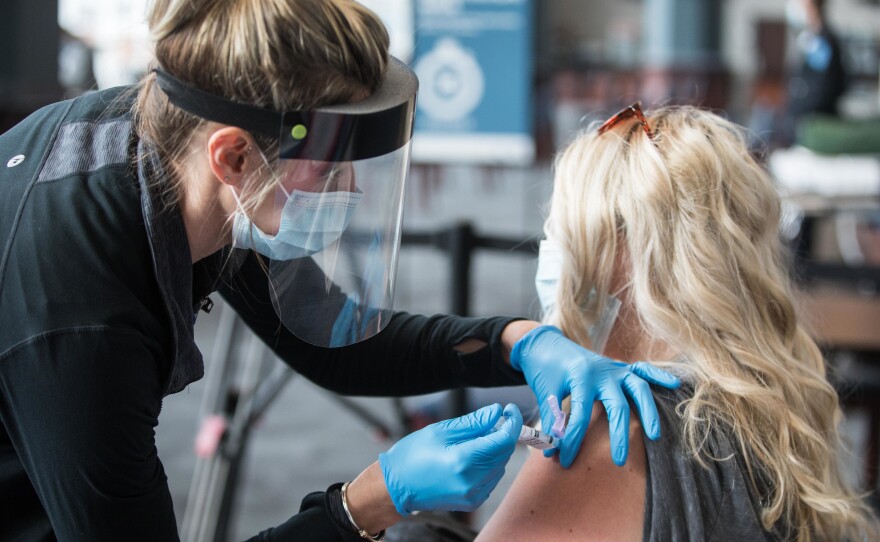The night before their inauguration, Joe Biden and Kamala Harris stood near the Lincoln Memorial and marked more than 400,000 people killed by the coronavirus. On Wednesday, the Biden administration takes responsibility for fighting the pandemic.
But for two of the biggest obstacles to curbing the pandemic — getting more people to wear masks and speeding up millions of COVID-19 vaccinations — the answer won't just come from federal leaders, an adviser to President Biden said.
The solutions will also be found locally around the country, said Dr. Celine Gounder, a clinical assistant professor at New York University and a member of Biden's COVID-19 advisory board.
To encourage mask use, Gounder said in an interview with NPR's Morning Edition, "I think you really need to draw upon people at the local level. It might be people's family doctors, or it could be the local police chief or the school superintendent or a faith leader."
And to meet Biden's goal of 100 million vaccinations in his first 100 days in office, she said, "We've got to massively increase the number of places where people can access vaccines." That includes working with local pharmacies, "standing up huge mass vaccination centers" and deploying mobile vaccine units in rural areas, she said.
Following are highlights of the interview, edited for length and clarity:
Interview Highlights
What changes in the approach to the pandemic will the public see right away?
I think one important key word here is partnership — partnership between the federal government, state, local, territorial and tribal governments and public health departments as well as primary care providers on the ground and pharmacies. Unfortunately, the federal government has been largely AWOL on much of the response.
The Operation Warp Speed plan was really just a plan to address market failures in vaccine research and development. But once those vaccine doses were manufactured, are manufactured, there hasn't been much of a federal plan. And so partnership is going to be what we're going to see changing in a big way.
Do you think this administration is going to be any more successful in getting states and cities to agree on some kind of standard for masking?
I don't know if it necessarily even needs to be mandated. I think [Biden] has said he is asking Americans to wear masks for the first 100 days of his office. It's sort of how Americans are being asked to pitch in while we focus on getting 100 million doses of vaccines into arms in those first 100 days.
Do you think that just being directly asked by a president who clearly believes in masks is going to make a significant difference?
I think it depends on how [Biden] brings people together. I think if he makes people, if he helps people feel like, look, we're all in this together, where he's bridging divides, has conciliatory tone in the way he is speaking to Americans instead of driving a wedge into our divides. I do think that there is the potential for more people to adopt this.
Have you had discussions about, how you communicate with people who find the masks an imposition or buy into conspiracy theories or find it creeping socialism?
It's almost become a cliché, this idea of trusted messengers. But it's really an effective one where sometimes it's not us, sometimes it's not Dr. [Anthony] Fauci or the director of the CDC, who will soon be Dr. Rochelle Walensky, who will be the most effective messenger. I think you really need to draw upon people at the local level. It might be people's family doctors, or it could be the local police chief or the school superintendent or a faith leader. But really working with people who are embedded in communities who are trusted, giving them the information, bringing them on board and having them be the ones messaging about these things.
Some vaccines are available, and Biden has promised 100 million shots in 100 days. How can you improve distribution of the vaccine so that that happens?
Well, we've got to massively increase the number of places where people can access vaccines. So that means working with local pharmacies, where many of us pick up our prescription drugs or do our shopping. That means standing up huge mass vaccination centers. And that's not just the Dodger Stadium and Fenway parks, but that's also looking at community vaccination centers, especially in the hardest-hit, hardest-to-reach communities. It means working with local primary care doctors, including federally qualified health centers that do work with underserved and vulnerable populations. And finally, mobile vaccine units to rural parts of the country.
When you look at this daunting challenge, do you look at that 100 million shots in 100 days and say to yourself as a professional, I hope this happens — or this is going to happen?
Look, it's a big task that's before us. But with 4,000 Americans dying per day from [the] coronavirus currently, we simply have no other choice.
Copyright 2021 NPR. To see more, visit https://www.npr.org.






